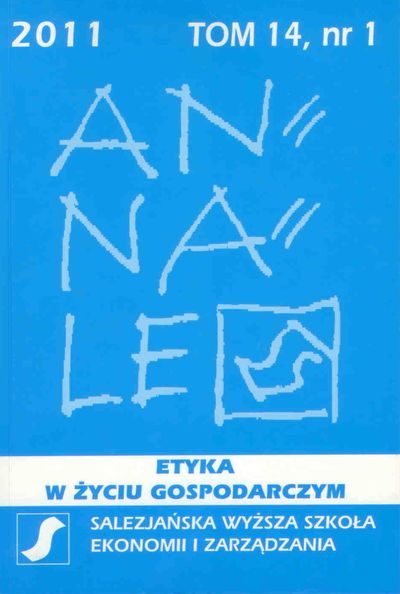Moralność i religia a rozwój kapitalizmu w ujęciu Deepaka Lala
DOI:
https://doi.org/10.18778/1899-2226.14.1.06Słowa kluczowe:
morality, religion, civilization, Deepak LalAbstrakt
The economist Deepak Lal researches the influence of morality and religion on the shaping of capitalism in different civilizations. His thought was confronted with the remarks of other institutionalists. Lal tries to find out what was the influence of the cost of transactions and the religious beliefs on the evolution of capitalism in chosen countries and regions. Lal claims that materialistic beliefs of agricultural civilizations had not played the key role in the economic growth. The reforms in the Church in the Middle Ages allowed to spread of the instinct of exchange and production of homo oeconomicus. As a result the individualism started to dominate over collectivism. Lal tries to prove that the individualism was not the basis of the Christian faith. The following virtues as: diligence, discipline, frugality, self-help, self-control have had secular origin and nowadays they are more common in India and China than in the West. The Asian civilizations face the dilemma during the economic expansion of the West. They had to choose the path of their development. China and India followed Japan and they modernized without westernization. They tried to find middle course between the tradition and the modernity. We tried to emphasize in the article, that none of the religions have determined the economic fate of the countries. Rather, the morality of the societies and the decision-makers’ beliefs had an influence on economic development.Bibliografia
Bauman Z., Sztuka życia, Wydawnictwo Literackie, Kraków 2009.
Google Scholar
Beattie A., False Economy. A Surprising Economic History of the World, Riverhead Books, New York 2009.
Google Scholar
Clements J., Konfucjusz. Biografia, Instytut Wydawniczy Erica, Warszawa 2007.
Google Scholar
Gandhi M.K., Autobiografia. Dzieje moich poszukiwań prawdy, Książka i Wiedza, Warszawa 1969.
Google Scholar
Godłów-Legiędź J., Główny nurt współczesnej ekonomii: od formalizmu do nowego instytucjonalizmu [w:] H. Landreth, D.C. Colander, Historia myśli ekonomicznej, Wydawnictwo Naukowe PWN, Warszawa 2005, Aneks do wydania polskiego.
Google Scholar
Godłów-Legiędź J., Paradygmat kosztów transakcji [w:] Z historii myśli ekonomicznej i historii gospodarczej. Księga jubileuszowa prof. dr. hab. Wiesława Piątkowskiego, Wydawnictwo UŁ, Łódź 2006.
Google Scholar
Lal D., Reviving the Invisible Hand. The Case for Classical Liberalism in the Twenty-First Century, Princeton University Press, New Jersey 2006.
Google Scholar
DOI: https://doi.org/10.1515/9781400837441
North D.C., Pojmowanie zmian ekonomicznych i wzrostu gospodarczego [w:] Globalizacja. Marginalizacja. Rozwój, red. G.W. Kołodko, Wydawnictwo Wyższej Szkoły Przedsiębiorczości i Zarządzania im. Leona Koźmińskiego, Warszawa 2003.
Google Scholar
Piątkowski W., Wykłady z historii myśli ekonomicznej. Starożytna Grecja i Rzym, Wydawnictwo Absolwent, Łódź, 2001.
Google Scholar
Veblen T., Teoria klasy próżniaczej, Warszawskie Wydawnictwo Literackie MUZA SA, Warszawa 1998.
Google Scholar
von Hayek F.A., Droga do zniewolenia, Wydawnictwo Arcana, Kraków 2003.
Google Scholar
Pobrania
Opublikowane
Jak cytować
Numer
Dział
Licencja

Utwór dostępny jest na licencji Creative Commons Uznanie autorstwa – Użycie niekomercyjne – Bez utworów zależnych 4.0 Międzynarodowe.









